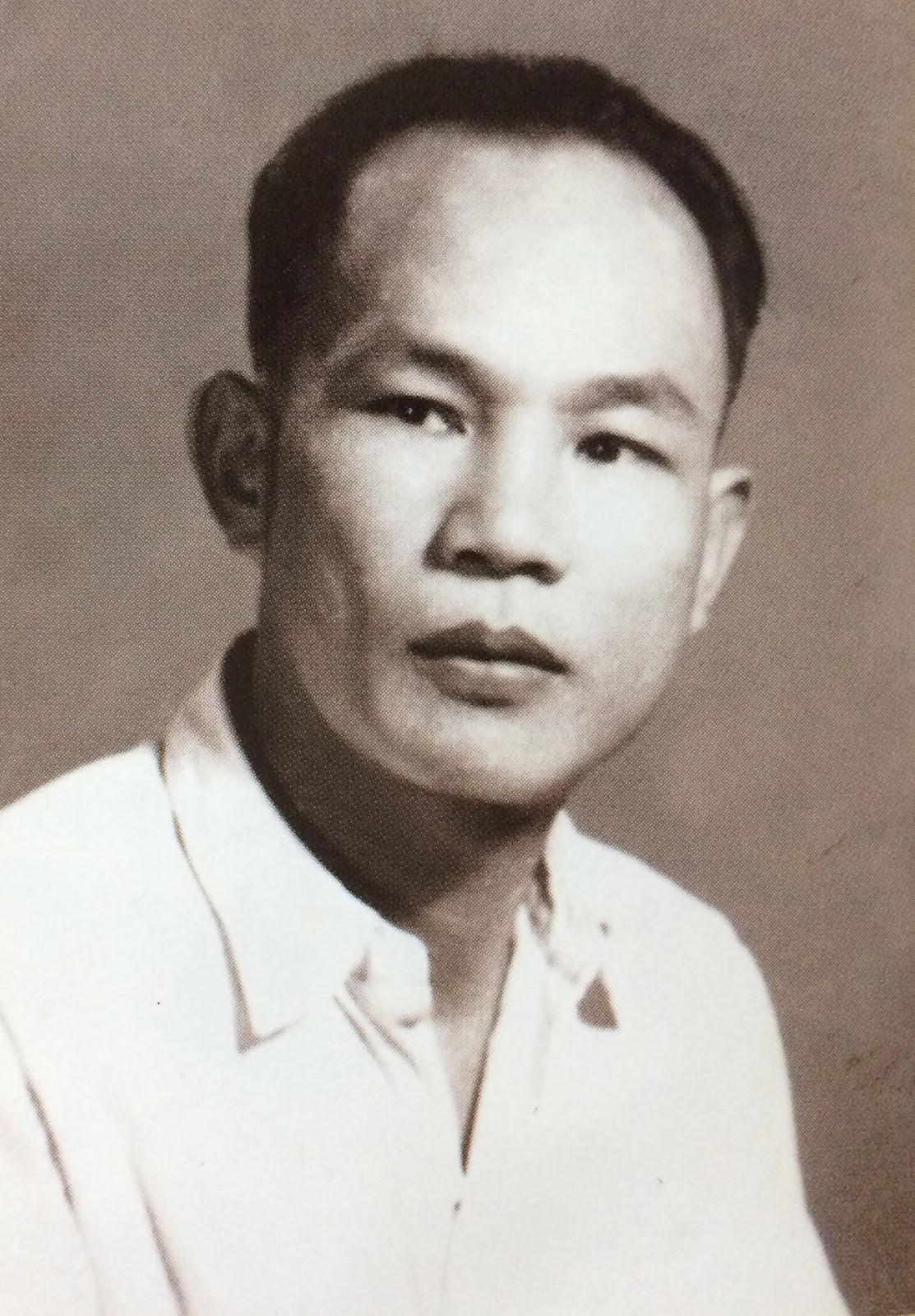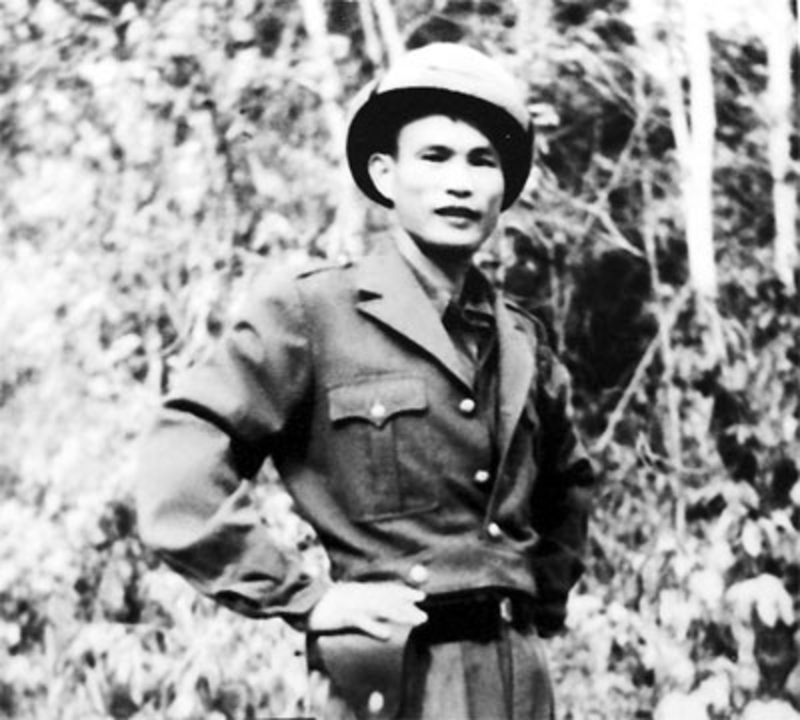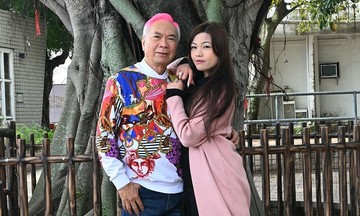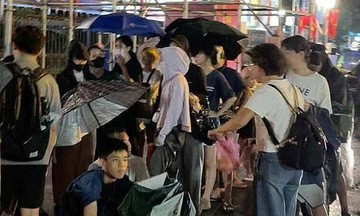In Ho Chi Minh City and several provinces in the southeastern region today, the name of poet-warrior Huynh Van Nghe graces many streets, a testament to the soldier who contributed to the resistance against colonialism and possessed the soul of a poet.
The poet was born in 1914 into a poor family in Tan Tich village, My Loc commune, Tan Uyen district, Bien Hoa province (now Thuong Tan commune, Ho Chi Minh City), a place he called "homeland of deep forests and long rivers". As a child, he often listened to his mother recount stories of anti-French resistance fighters in his hometown. When he went to Saigon to study at Petrus Ky High School, young Huynh Van Nghe began to "ponder the meaning of life", and early on, he sought out communists and embraced revolutionary ideals. In 1937, he joined the Indochinese Communist Party. Three years later, he participated in the Nam Ky uprising. After the failed uprising, some soldiers retreated to the Tan Uyen forest to continue their activities, and the poet was tasked with supplying them with ammunition and medicine. In 1942, when discovered by the French colonialists and their collaborators, he fled to Thailand and became active in the patriotic Vietnamese expatriate movement. There, he organized the publication of the newspaper *Hon Co Huong* (Homeland Soul), calling on overseas Vietnamese to support their homeland.
During the southern resistance, Huynh Van Nghe and several others gathered forces and established the renowned D chien khu (War Zone D) in the southeastern region. From this place, he was known as the "poet-general of the green forest", and in combat, as the "grey tiger of the East".
 |
Poet Huynh Van Nghe. Photo: Archive |
Poet Huynh Van Nghe. Photo: Archive
Huynh Van Nghe began writing before 1945. Although his ideas were still developing and his language not yet refined, he vividly depicted the hardships of life in society at that time. The poet evoked strong emotions in the face of miserable lives, as in the poem *Dam Ma Ngheo* (Poor Funeral): "Whose funeral is it amidst the cold wind and drizzling rain?/ Four people carry a precarious coffin/ The wife cries out to the heavens, her voice hoarse/ Carrying her young child, she walks in the falling rain".
Huynh Van Nghe's poetry during this period often focused on everyday emotions. He frequently mentioned the image of a mother, in poems such as *Mo Bia* (Tombstone) (1936) and *Tron Hoc* (Skipping School) (1939). Interspersed with these sentimental works are glimpses of a young man full of spirit. The Dong Nai River flowing through Huynh Van Nghe's poetry does not possess the elegance of the Perfume River, nor the gentle tranquility of the Tien or Hau Rivers, but is a river that "braves mountains and forests" to "live and die seeking freedom".
During the resistance years, Huynh Van Nghe's poetry was likened to a resounding song in the forest, reflecting the resilient spirit of a soldier. In the book *Southern Literature from the Beginning to the Mid-20th Century (1900-1954)*, Huynh Van Nghe's poetry is described as "a true reflection of the resistance in the eastern war zone during difficult and fierce years". In the book *Dong Nai Gazetteer*, the authors write: "Huynh Van Nghe's demeanor was not much different from the patriotic scholars of the southern region in the previous century, except that he was a poet-warrior of an entirely new historical movement. Therefore, the people and the resistance life in Huynh Van Nghe's literature are realistic, yet no less heroic and full of valiant spirit."
The wartime life in the southeastern region, "arduous yet courageous", was described in detail by the poet. He portrayed the image of a soldier whose leg was amputated but who overcomes the pain by singing *Tien Quan Ca* (Marching Song), in the work *Tieng Hat Giua Rung* (Singing in the Forest) (1946), or Lieutenant General Nguyen Binh with his farewell journey from War Zone D to return to Dong Thap in 1946 in *Rung Nho Nguoi Di...* (The Forest Remembers the Departed...) (1947). He recounted many events that once stirred life in the war zone, such as the recapture of Ba Co Temple (*Mat Tan Uyen*, 1949), and the soldiers' meeting in the company (*Hoi Nghia Binh Cong*, 1954).
* Some works by Huynh Van Nghe
The poem *Nho Bac* (Missing the North) is considered the pinnacle of Huynh Van Nghe's creative career. The poem recounts the history of the days when our forefathers wielded swords to expand the country, revealing the longing of the southern people for the north. The work initiated a stream of poetry about the desire for national reunification from the early days of the anti-French resistance in 1946 to the victory over the American forces in 1975.
In the lines: "Still hearing the songs of Quan Ho/ Intertwined with the melancholic verses of Vong Co/ Still loving, still missing the season of red lychees/ Every time the scent of durian wafts by", Huynh Van Nghe chose two spiritual cultural features: Quan Ho and Vong Co, as well as the products red lychees and durian, representative of the two regions. These images imply that no matter where one is, the love for the homeland remains intertwined, without distinction.
*Nho Bac* was written in a modern style but with a classical touch, reminding readers of Tang poetry with its structure: introduction, development, discussion, and conclusion. Throughout his career, Huynh Van Nghe wrote many poems with a Tang poetry flavor through the use of archaic words, such as in *Xuan Chien Khu* (Spring in the War Zone) (1945) and *Buc Thu Thanh* (Letter to the City) (1947). This reflects the spirit of a person willing to live and die for his mission, not sentimental emotions in the face of the pain and loss of war.
 |
Poet-general Huynh Van Nghe in the war zone. Photo: Archive |
Poet-general Huynh Van Nghe in the war zone. Photo: Archive
Another of Huynh Van Nghe's works that is often mentioned is *Ben Bo Song Xanh* (By the Green Riverbank). The poem depicts the image of the soldier-poet Huynh Van Nghe and is also his declaration of his mission: "I also know longing and yearning/ Not just a warrior or a poet/ I am someone who rolls on the dusty road/ Making no distinction between sharpening the sword and wielding the pen".
After 1954, Huynh Van Nghe regrouped to the north. During this time, he continued to write, but not extensively, with poems such as *Cai Chet Cua Anh Xieng* (The Death of Brother Xieng), *Chien Khu D Chong Bao* (War Zone D Against the Storm), *Hinh Anh Bac Ho Trong Long Nam Bo* (The Image of Uncle Ho in the Hearts of the Southern People), and short stories with a memoir style such as *Tran Mang Xa* (The Python Battle), *Sau Do Mui* (Red-Nosed Crocodile), *Chua Ong Mo* (The Temple of the Wooden Fish), *Mat Don My Loc* (The Loss of My Loc Post), and *Tieng Hat Tren Song Dong Nai* (Singing on the Dong Nai River).
Huynh Van Nghe also completed two memoirs, including *Que Huong Rung Tham Song Dai* (Homeland of Deep Forests and Long Rivers), which recounts his childhood in Tan Uyen, his time studying in Saigon, and his initial sympathy for the revolution. The memoir *Nhung Ngay Song Gio* (Turbulent Days) recounts the period when his activities were exposed, forcing him to flee to Thailand, where he was later captured but escaped and returned home to find the revolutionary cell.
Poet Huy Can once commented on the Vietnamese people and country: "Carrying a sword on their back, with a gentle hand holding a flower pen", reflecting a beautiful tradition of the nation. Huynh Van Nghe is a continuation of the soldier-poets of the previous generation, as his military achievements and poems always went hand in hand.
Ha Thanh Van












